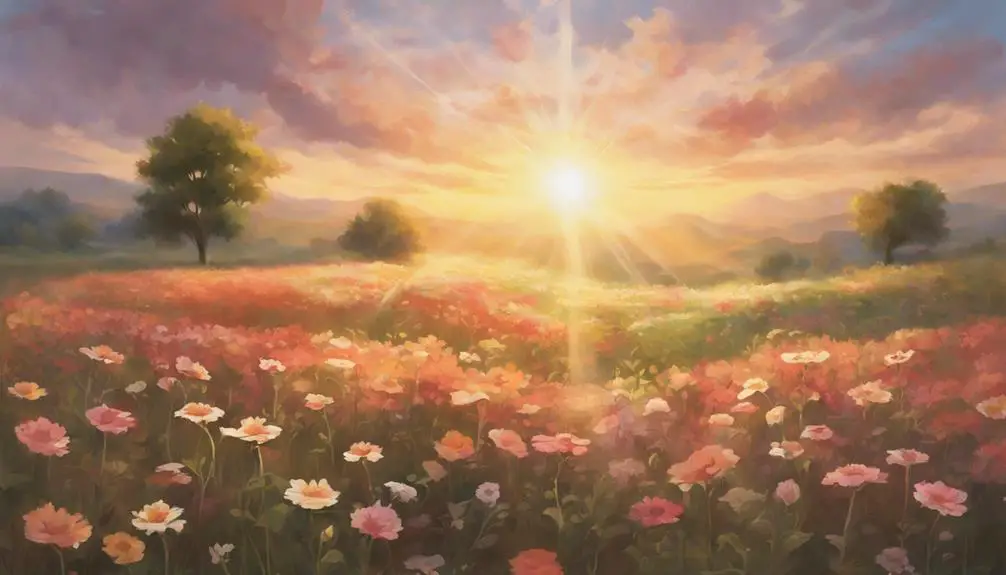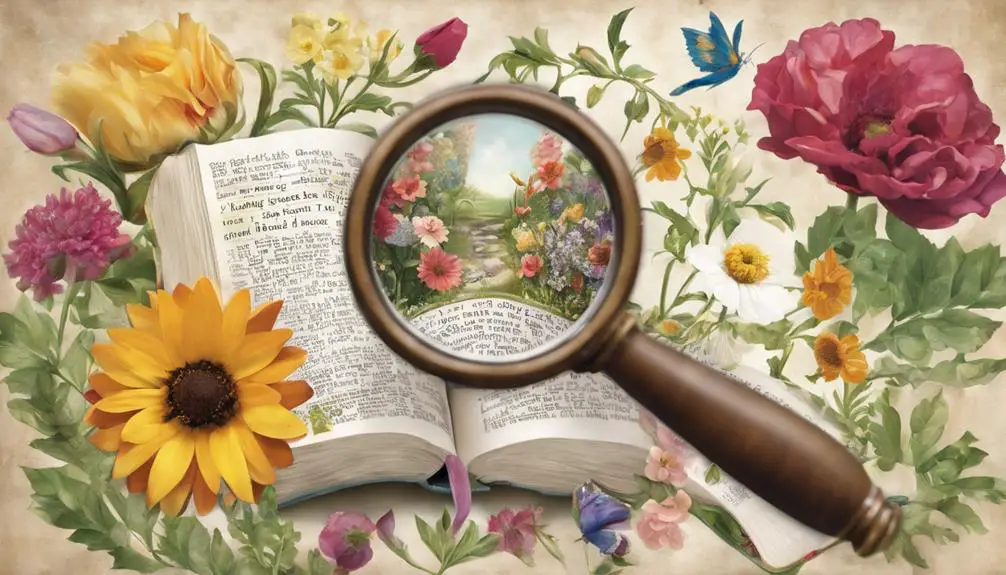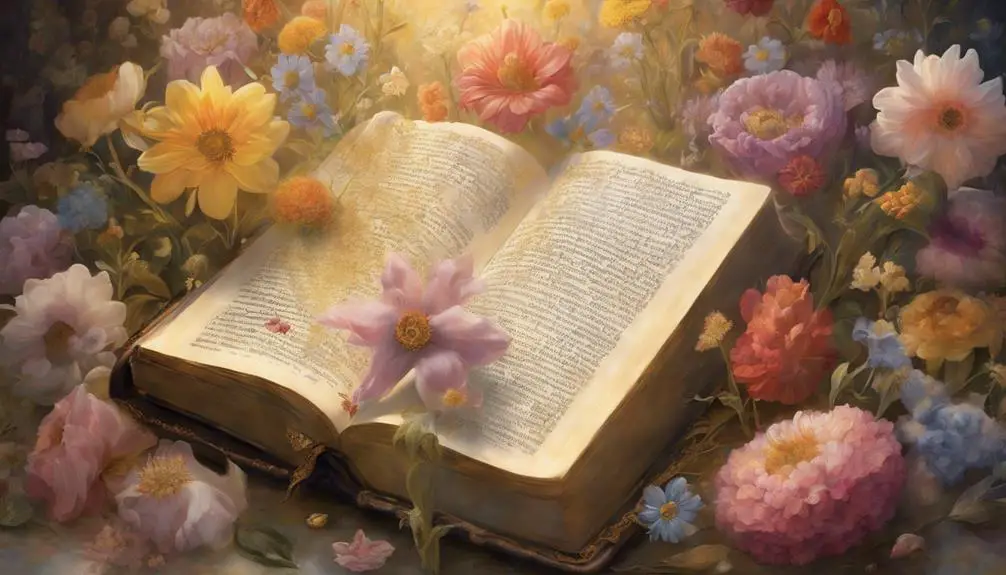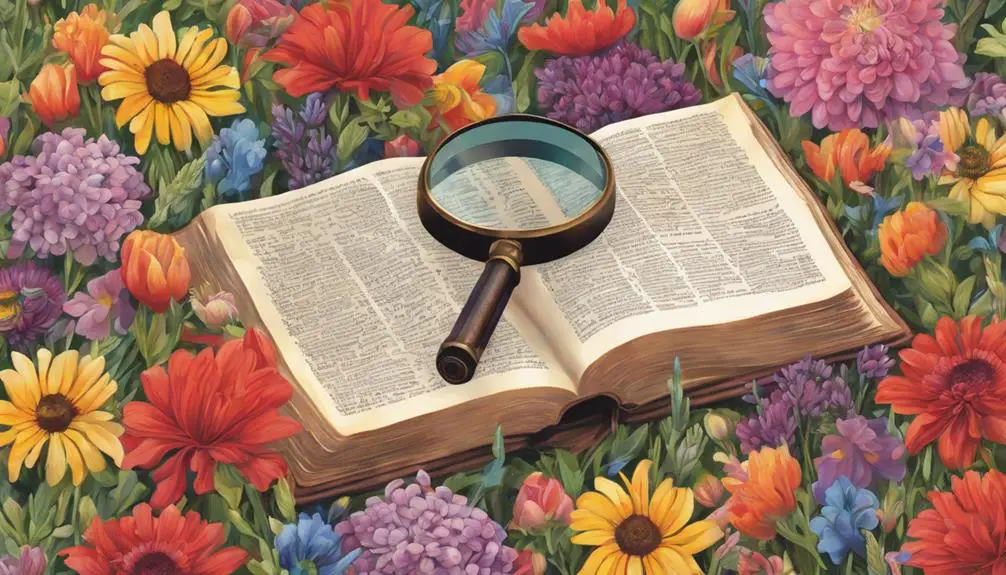Ponder the spiritual significance of floral imagery in the Bible in our exploration of a poignant verse.

A Bible Verse Making Mention About Flowers
Did you know that flowers are mentioned more than 200 times in the Bible? You might be surprised to learn that they're used as powerful symbols of beauty, transience, and divine attributes.
One verse, in particular, stands out for its poignant use of floral imagery. But before we unpack that verse, let's ponder. Why do you think flowers hold such a significant place in biblical literature? And what might this particular verse reveal to us about the nature of life and spirituality?
We're about to explore these intriguing questions.
Key Takeaways
- Flowers in the Bible symbolize beauty, transience, and divine attributes, portrayed over 200 times in various contexts.
- In Isaiah 40:8, flowers represent the fleeting nature of life contrasted with God's enduring word.
- Biblical verses use flowers as literary devices, adding depth and conveying deeper meanings to the text.
- Floral references in the Bible offer spiritual metaphors, enhancing believers' understanding of God's nature and divine provision.
The Verse and Its Context

To fully comprehend the biblical verse about flowers, it's essential to delve into both its literal wording and the broader context in which it's nestled. From the book of Isaiah, the verse reads, 'The grass withers, the flower fades, but the word of our God will stand forever.' Here, the fleeting nature of flowers is juxtaposed with the enduring truth of God's word.
You may wonder why flowers are used to symbolize temporal existence. In ancient times, flowers, specifically in the Middle East where the Bible was written, bloomed briefly due to harsh climates. Their brief beauty encapsulates the transience of life, making them apt metaphors.
The context is equally crucial. Isaiah is a prophetic book, filled with visions of future hope despite present suffering. This verse comes amid a comforting prophecy, assuring the Israelites of God's unchanging word amidst life's uncertainties.
Thus, the verse isn't merely about flowers, but about the larger theological message of God's enduring truth. It's a message of solace in temporal concerns, rooted in the permanence of divine assurance. Understanding this context deepens the verse's resonance and relevance.
Symbolism of Flowers in the Bible

Diving into the symbolism of flowers in the Bible, you'll uncover a rich tapestry of metaphors that enhance our understanding of key biblical messages. Flowers often represent the fragility and brevity of life. For instance, the grass withers and the flowers fall in Isaiah 40:8 signifies human mortality contrasted with God's eternal word.
Flowers also symbolize beauty and glory. Consider the lilies in Luke 12:27, where they're described as more splendid than Solomon in all his glory. This metaphorically underlines God's provision and care. Similarly, the rose of Sharon and lily of the valleys in Song of Solomon 2:1 speak of love and beauty in a poetic, romantic context.
The use of flowers as metaphors extends beyond individual verses. They're integral to parables and stories, adding depth to the narrative. The mustard seed's transformation into a large tree (Matthew 13:31-32) represents the Kingdom of God's growth from small beginnings.
Literary Analysis of the Verse

Building on the symbolic meanings we've explored, let's now scrutinize the literary aspects of these biblical verses involving flowers. To aid your understanding, we'll break down three verses into their literary components: setting, character, and theme.
Verse |
Setting |
Character |
Theme |
|---|---|---|---|
Isaiah 40:8 |
A prophetic vision |
God as the speaker |
Transience of life |
Song of Solomon 2:1 |
Lover's dialogue |
The woman as speaker |
Love and beauty |
Matthew 6:28-30 |
Sermon on the Mount |
Jesus as speaker |
Faith and providence |
In Isaiah 40:8, the setting is prophetic, the character is God, and the theme is the transience of life. The Song of Solomon 2:1 places us within a lover's dialogue, where the woman, as speaker, uses the image of the flower to explore themes of love and beauty. Lastly, in Matthew 6:28-30, Jesus uses the flower as a symbol within His Sermon on the Mount, to convey themes of faith and providence. Deeply entwined with the narrative, these verses demonstrate how flowers serve as literary devices, enhancing the depth and resonance of biblical text.
Spiritual Implications

Beyond their literary value, these floral references in the Bible also hold profound spiritual implications that resonate with believers. The flowers, often symbolizing beauty, purity, and transience, offer a rich tapestry of spiritual insights. They're not merely ornamental details tucked in the scripture, but potent symbols that convey profound theological truths.
Consider the lily, frequently mentioned in the Bible. It's not just appreciated for its aesthetic appeal but is often used as an emblem of God's provision and care. As you reflect on verses like Matthew 6:28-30, you're reminded that if God clothes the lilies with such splendor, how much more will He provide for you, His beloved creation. This underpins the spiritual principle of divine sustenance and trust in God's providence.
Roses, another floral reference, symbolize love, particularly divine love. Song of Solomon 2:1, 'I am the rose of Sharon,' is an affirmation of the believer's identity in Christ and His love for them. These floral references, thus, serve as spiritual metaphors, enhancing believers' understanding of God's nature and His promises. They're more than beautiful imagery; they're spiritual tools, teaching and reaffirming faith.
Reflections on the Floral Verse

As we turn our focus to 'Reflections on the Floral Verse', it's intriguing to see how these Biblical floral metaphors can deepen your understanding and appreciation of spiritual truths. The Bible, rich in metaphorical language, uses the imagery of flowers to convey messages of spirituality, morality, and divine wisdom.
Consider the verse in Isaiah 40:8, 'The grass withers, the flower fades, but the word of our God will stand forever.' Here, the transience of flowers serves as a poignant contrast to the enduring nature of God's word. Similarly, in Matthew 6:28-30, Jesus draws attention to the lilies, which despite their lack of toil, are beautifully adorned by God, highlighting divine providence and the futility of worldly anxieties.
In Song of Solomon 2:1, the speaker declares, 'I am the rose of Sharon, and the lily of the valleys.' The rose and lily, both emblematic of beauty and purity, are used to symbolize the speaker's spiritual identity and relationship with God.
In dissecting these floral verses, you're invited to delve deeper into the Biblical text, enrich your spiritual insights, and cultivate an appreciation for the complexity and depth of Biblical symbolism.
Conclusion
In closing, the floral verse's biblical context and symbolic undertones enlighten us about the essence of flowers in the sacred text.
A deeper literary analysis further unravels the verse's spiritual implications. It's more than mere words; it's a spiritual guide, a symbolic representation of divine truths.
Reflecting on this, one can truly appreciate the profound wisdom and beauty ingrained in such biblical metaphors.



Sign up